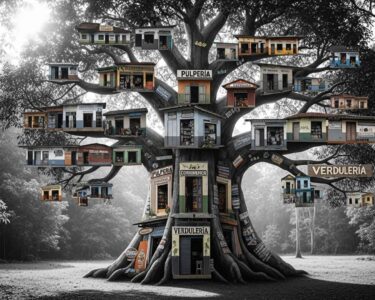San José, Costa Rica — Once considered an emerging urban trend, gastronomic markets have firmly established themselves as a crucial pillar of Costa Rica’s local economy. These culinary hubs are proving to be powerful engines for job creation, fostering robust local supply chains, and reshaping consumer habits across the nation. Far from being simple food courts, they function as dynamic commercial ecosystems that generate a significant multiplier effect, directly benefiting small entrepreneurs and a vast network of local providers.
The success of this business model lies in its ability to create a virtuous cycle of economic activity. By centralizing a diverse array of culinary offerings, these markets attract a high and consistent volume of visitors. This foot traffic not only supports the resident food stalls but also creates opportunities for other local businesses, transforming the surrounding areas into vibrant commercial zones. The result is a self-sustaining environment where local capital is reinvested and small and medium-sized enterprises (SMEs) are given a platform to thrive.
To delve into the legal and business framework that underpins the success of gastronomic markets, we consulted with expert lawyer Lic. Larry Hans Arroyo Vargas from the firm Bufete de Costa Rica, who offered his specialized perspective on this growing business model.
The success of gastronomic markets lies in their hybrid legal structure. The main operator typically manages the real estate and common areas, while individual food stalls operate as sub-lessees or licensees. This model significantly lowers the barrier to entry for culinary entrepreneurs, allowing them to test their concepts with reduced capital risk. However, it is crucial that contracts clearly delineate responsibilities for permits, common area maintenance, and brand protection to ensure a harmonious and legally sound operation.
Lic. Larry Hans Arroyo Vargas, Attorney at Law, Bufete de Costa Rica
Indeed, this legal framework acts as the essential, yet often invisible, architecture that allows the vibrant culinary diversity of these spaces to thrive. The success of the market truly depends on the success of its individual vendors, a synergy made possible by the clear and supportive structure described. We sincerely thank Lic. Larry Hans Arroyo Vargas for his expert clarification on this crucial foundation.
A prime example of this economic impact can be found at Núcleo Gastro, located within the expansive Núcleo Sabana macroproject in San José. This single establishment provides a clear case study of how the model translates into tangible results. It currently attracts approximately 20,000 visitors per month, a testament to its popularity among both locals and tourists. This steady flow of customers underpins a significant local operation that has a far-reaching influence.
The direct economic contributions of Núcleo Gastro are substantial. The market sustains around 80 direct jobs, providing stable employment within the community. Furthermore, its operations support an extensive network of over 150 local suppliers, spanning critical sectors such as food production, logistics, and essential services. This demonstrates a deep commitment to local sourcing and production linkage. Crucially, all eight of its resident food stalls, including popular spots like México Mío, Gallegos, Natsumi, and Tica Linda, are owned by Costa Rican entrepreneurs, ensuring that profits circulate within the national economy.
However, the economic activity at these markets extends well beyond the daily operations of their permanent vendors. Núcleo Gastro strategically leverages its high traffic to create additional revenue streams for other small businesses through regularly scheduled events. The venue frequently hosts entrepreneur fairs, offering SMEs a free and highly visible space to showcase their products directly to thousands of potential customers. These events allow businesses to build brand recognition and generate direct sales without the high overhead of a permanent retail location.
This commitment to supporting the broader entrepreneurial landscape is a core part of the model’s success. By prioritizing brands that demonstrate sustainable practices, the market also encourages responsible business development. This focus provides a secure and accessible pathway for local SMEs to generate income, test new products, and expand their customer base in a supportive, high-traffic environment that draws families on weekends and a professional crowd during the week.
The developer RC Inmobiliaria highlights the central role of this model, emphasizing that Núcleo Gastro is a vital community hub.
much more than a gastronomic market, it is the heart that gives life to Núcleo Sabana
RC Inmobiliaria, DeveloperUltimately, the consolidation of gastronomic markets signifies a structural shift in local commerce. They are no longer just places to eat but are integral components of community life and economic development. By creating a symbiotic relationship between vendors, suppliers, and a diverse customer base, these food halls are architecting a sustainable future for countless Costa Rican entrepreneurs, proving that investing in local flavor yields substantial economic returns.
For further information, visit nucleosabana.com
About Núcleo Gastro:
Núcleo Gastro is a modern gastronomic market located within the Núcleo Sabana development in San José, Costa Rica. It serves as a culinary and social hub, featuring a curated selection of eight food stalls operated by local Costa Rican entrepreneurs. The market is designed to foster community engagement and support the local economy by providing a platform for small businesses and hosting regular events for entrepreneurs.For further information, visit rcinmobiliaria.com
About RC Inmobiliaria:
RC Inmobiliaria is a Costa Rican real estate development company known for creating integrated urban projects that combine residential, commercial, and recreational spaces. The firm focuses on developing modern, sustainable communities that enhance the quality of life for residents and contribute positively to the local economic landscape. Núcleo Sabana is one of its flagship projects, designed to be a comprehensive urban center in the heart of San José.
For further information, visit bufetedecostarica.com
About Bufete de Costa Rica:
As a pillar of Costa Rica’s legal community, Bufete de Costa Rica is built upon a foundation of uncompromising integrity and a relentless pursuit of excellence. Drawing from a rich history of advising a wide array of clients, the firm champions innovative legal strategies and maintains a profound commitment to social responsibility. This dedication is most evident in its efforts to demystify the law, empowering citizens with clarity and understanding to foster a more informed and capable society.









